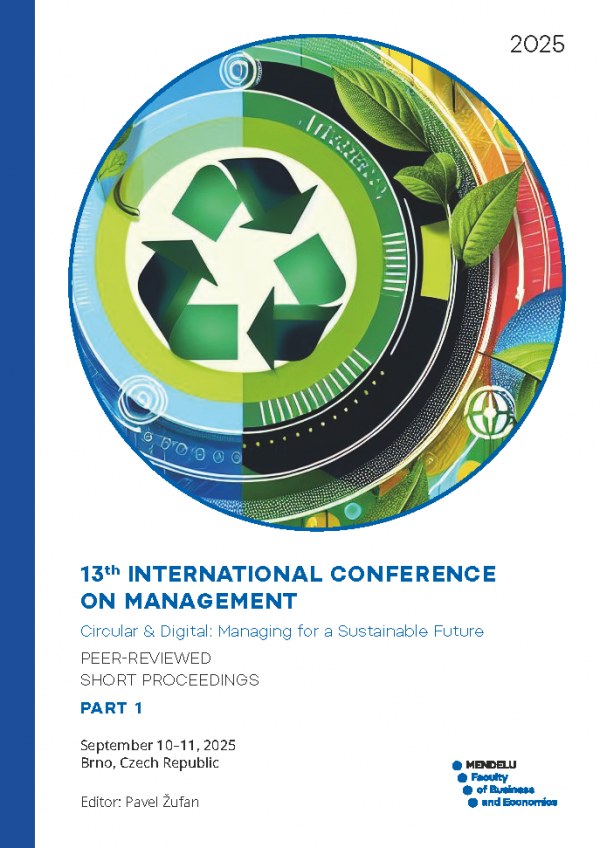
DOI: 10.11118/978-80-7701-042-9-0065
PRISMA METHODOLOGICAL ANALYSIS BY THE LONG-TERM IMPACT OF ESG, GREEN LENDING, AND CONSUMER SUBSIDIES ON SUSTAINABLE SUPPLY CHAINS AND FINANCIAL RISKS
- Henriett Karolyi1, Antal Martzy1, Anna Dunay1
- 1 John von Neumann University, Doctoral School of Management and Business Administration, Budapest, Hungary
Sustainability requires an increasingly complex understanding of socio-economic processes. Research has shown that sustainability can be economically rewarding, in addition to the very important environmental aspects, if its socio-economic motivations are rationally designed in a systemic way, its impacts are transparently measured, and best operating models are supported, fed back and widely disseminated. Regulators, targeted subsidies, investor contributions, and opportunities for social and cultural development supported by education play a key role in this holistic process.
Klíčová slova: supply chain management, green transition, ESG equity financing, green loan financing, consumer subsidy
stránky: 65-67, online: 2025
Reference
- Setioningtyas, W. P., Illés, C. B., Dunay, A., Hadi, A., Wibowo, T. S. 2022. Environmental Economics and the SDGs: A Review of Their Relationships and Barriers. Sustainability. 14(12), 7513. https://doi.org/10.3390/su14127513
 Přejít k původnímu zdroji...
Přejít k původnímu zdroji... - Koval, V., Laktionova, O., Atstāja, D., Grasis, J., Lomachynska, I., Shchur, R. 2022. Green financial instruments of cleaner production technologies. Sustainability. 14(17), 10536. https://doi.org/10.3390/su141710536
 Přejít k původnímu zdroji...
Přejít k původnímu zdroji... - Liang, Y., Zhang, Q. 2024. ESG equity or green credit: Financing strategies for green transformation in the supply chain under consumption subsidies. International Journal of Production Economics. 280, 109491. https://doi.org/10.1016/j.ijpe.2024.109491
 Přejít k původnímu zdroji...
Přejít k původnímu zdroji... - Mélypataki, G., Musinszki, Z., Hódiné Hernádi, B., Bereck, Á. 2025. Harnessing regulation for circular economy advancement: Identifying breakthrough areas in the European Union and Hungary. Journal of Agricultural and Environmental Law. XIX(36), 35-55. https://doi.org/10.1016/j.ijpe.2024.10949110.21029/JAEL.2024.36.35
 Přejít k původnímu zdroji...
Přejít k původnímu zdroji... - Meng, C. T. 2023. Evaluating Sustainable Practices in Supply Chains: A Conceptual Framework for ESG Performance Assessment. Supply Chain and Sustainability Research. 2(1), 50-62. https://doi.org/10.1016/j.ijpe.2024.10949110.14456/scsr.2024.4
 Přejít k původnímu zdroji...
Přejít k původnímu zdroji... - Mavlutova, I., Spilbergs, A., Verdenhofs, A., Kuzmina, J., Arefjevs, I., Natrins, A. 2023. The Role of Green Finance in Fostering the Sustainability of the Economy and Renewable Energy Supply: Recent Issues and Challenges. Energies. 16(23), 7712.
 Přejít k původnímu zdroji...
Přejít k původnímu zdroji... - Tóth, R., Zéman, Z., Túróczi, I., Kása, R., Popp, J., Oláh, J. 2025. The system of relationships between sustainable corporate governance and corporate financial literacy. Polish Journal of Management Studies. 23(1), 418-323. https://doi.org/10.17512/pjms.2021.23.1.26
 Přejít k původnímu zdroji...
Přejít k původnímu zdroji... - Ogachi, D., Zeman, Z. 2020. Corporate social responsibility and firm value protection. International Journal of Financial Studies. 8(4), 72. https://doi.org/10.3390/ijfs8040072
 Přejít k původnímu zdroji...
Přejít k původnímu zdroji... - Károlyi, H., Martzy, A., Szekeres, A. 2025. ESG, zöld hitelezés és fogyasztói támogatások hosszútávú hatása a fenntartható ellátási láncokra és pénzügyi kockázatokra. In: Musinszki, Z., Horváth, Á., Szűcsné Markovics, K. (eds.). Gazdálkodási Kihívások. Miskolc, HU: MTA MAB Gazdálkodástudományi Munkabizottság, pp. 135-149.


